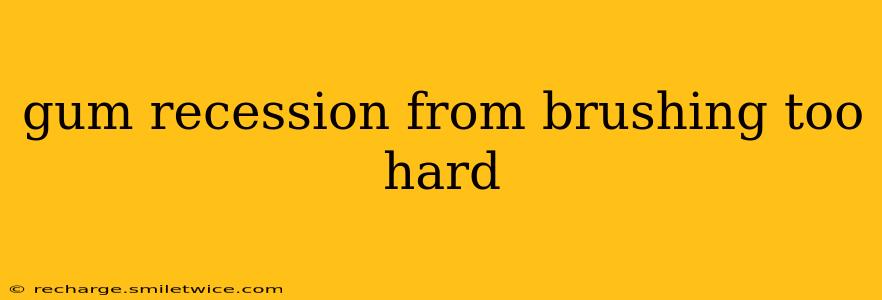Gum recession, the gradual shrinking of gum tissue, exposing more of the tooth's root, is a common dental problem. While genetics and certain medical conditions play a role, aggressive brushing is a significant contributor. Understanding the connection between brushing too hard and gum recession is crucial for maintaining healthy gums and preventing serious dental issues.
What causes gum recession from brushing too hard?
Aggressive brushing, characterized by excessive force and abrasive toothpastes, damages the delicate gum tissue. The abrasive action wears away the enamel and irritates the gums, leading to inflammation (gingivitis). Over time, this inflammation can destroy the supporting structures of the teeth, causing the gums to recede. The hard bristles can act like sandpaper, literally scraping away the gum tissue. This process is exacerbated by improper brushing techniques, such as scrubbing back and forth instead of using gentle, circular motions.
Can brushing too hard cause gum disease?
Yes, absolutely. While brushing too hard doesn't directly cause gum disease (periodontitis), it significantly increases the risk. The inflammation caused by aggressive brushing creates an ideal environment for bacteria to thrive, leading to the progression of gingivitis to periodontitis. Periodontitis is a severe form of gum disease that can cause tooth loss if left untreated. The receding gums expose the roots of the teeth, making them more vulnerable to decay and sensitivity.
How to tell if you're brushing too hard?
Several signs indicate you might be brushing too hard:
- Bleeding gums: While a little bleeding occasionally isn't a major concern, consistent bleeding after brushing is a clear warning sign.
- Receding gums: Noticeable gum line recession, exposing more of your teeth than usual.
- Sensitive teeth: Increased sensitivity to hot, cold, or sweet foods and drinks.
- Red, swollen, or tender gums: Inflammation is a key indicator of aggressive brushing.
- Tooth wear: Noticeable wearing away of the enamel on your teeth.
How to prevent gum recession from brushing?
Preventing gum recession involves adopting a gentler brushing technique and making smart choices about your oral hygiene routine:
- Use a soft-bristled toothbrush: Soft bristles are gentler on gums and still effectively remove plaque.
- Brush gently in circular motions: Avoid scrubbing back and forth. Focus on gentle, circular motions, aiming to clean every tooth surface.
- Brush for two minutes, twice a day: Adequate brushing time is essential, but it shouldn't involve excessive pressure.
- Choose a fluoride toothpaste: Fluoride strengthens tooth enamel and protects against decay.
- Use a low-abrasive toothpaste: Look for toothpastes that are specifically designed for sensitive teeth or gums.
- Don't forget to floss: Flossing removes plaque and food particles from between your teeth, preventing gum inflammation.
- Visit your dentist regularly: Regular checkups and professional cleanings help detect and address gum problems early.
What are the treatments for gum recession?
If you've already experienced gum recession, several treatment options are available:
- Scaling and root planing: A deep cleaning procedure to remove plaque and tartar buildup below the gum line.
- Gum grafting: A surgical procedure to replace lost gum tissue.
- Guided tissue regeneration: A surgical technique used to regenerate lost gum tissue and bone.
- Enamel Matrix Derivative (EMD): A protein gel applied to the root surfaces to stimulate tissue repair.
Is gum recession reversible?
Unfortunately, gum recession is often not fully reversible. However, the progression can be halted, and treatment can help improve gum health and prevent further recession. Early detection and intervention are key to managing the condition effectively.
Can I reverse gum recession at home?
While you can't reverse gum recession entirely at home, adopting a gentler brushing technique, using a soft-bristled toothbrush, and maintaining excellent oral hygiene can help prevent further recession and improve gum health. However, for significant gum recession, professional dental intervention is necessary.
How long does it take for gums to heal from brushing too hard?
The healing time varies depending on the severity of the damage. Minor irritation may heal within a few days, while more significant damage could take weeks or even months to fully recover. Regular gentle brushing and good oral hygiene are crucial during the healing process. Consistent bleeding, however, warrants immediate consultation with a dentist.
Remember, maintaining healthy gums is essential for overall oral health. If you're concerned about your brushing technique or have noticed signs of gum recession, consult your dentist immediately. They can assess your condition, advise on appropriate treatment, and guide you toward maintaining optimal oral hygiene.
